Delhi / Calcutta, BRITISH INDIA:
The 1860s and 70s were a difficult time for the old and noble families of Delhi. The changes ushered in after the rising of 1857 had precipitated the decline of the city that had begun with the invasion of Nadir Shah over a century ago. The grandeur of the old Mughal capital was gone and with it disappeared the wealth and commerce. This was the era of Mirza Asadullah Khan Ghalib and his poetry of decrepitude and nostalgic longing. Old merchant families were particularly badly hit.
The Ellahies were just such an old family of Delhi merchants. By the 1870s it was being run by Hajee Karam Ellahie. The writing was however, on the wall and the family realized that opportunities in Delhi were dwindling. Karam’s much younger brother, Bukhsh, an ambitious young man therefore decided that he would not sit around waiting for the decline to be complete. Rather he would take on the challenges of the new era head on.
If Delhi was in decline, the new capital of the British, Calcutta, had been growing rapidly over the same period. By the second half of the nineteenth century it was a city bursting with opportunities, ideas and wealth. Young Bukhsh decided the best way to approach the new age was to move to Calcutta. In 1878 he joined an old Muslim firm in Calcutta as a young apprentice hoping to pick up enough skills to survive in the new order.
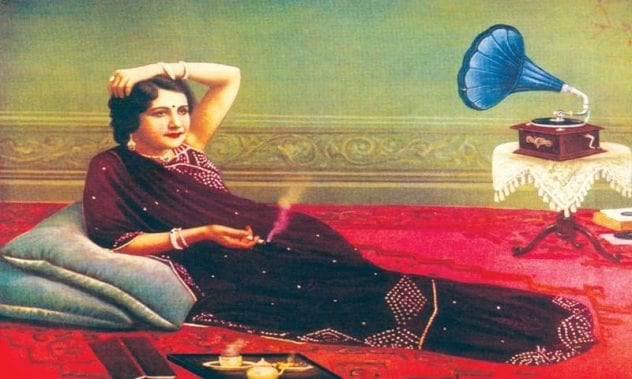
During his time in the city, Ellahie also keenly observed his fellow denizens closely. Amongst the new fashions that caught his eye was the habit of smoking cigarettes. The British army had picked up the habit during the Crimean War in the mid-1850s from their Turkish rivals. Unbeknownst to Ellahie precisely around the 1880s, when he was apprenticing in Calcutta, a new cigarette-rolling machine was making it faster and cheaper to produce cigarettes commercially.
A shrewd businessman, Bukhsh soon asked his older brother to lend him some capital to start a business importing tobacco to make cigarettes. In 1885, with his brother’s loan, Bukhsh set up Bukhsh Ellahie & Co. Apart from new production techniques he also adopted new advertising techniques to popularize the new trend in the city. Cashing in on the growing celebrity of the Hindustani classical singer, Gauhar Jaan, Bukhsh Ellahie launched a brand of local cigarettes called the ‘Gauhar be Baha’. he also distributed free cigarettes to the army as a precocious new promotional tool.
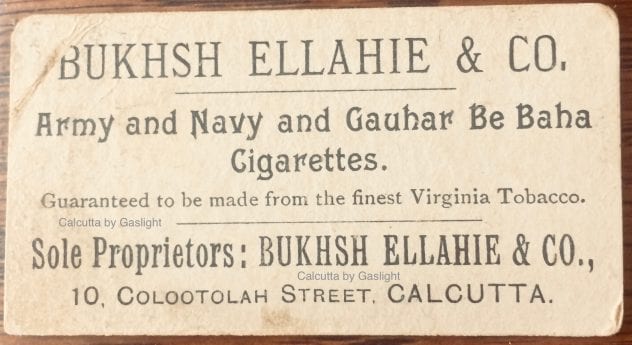
The brand and the business were an enormous success. Before the century ended, Bukhsh was one of the richest men in the city. So complete was Bukhsh Ellahie’s domination of the local market that when foreign firms such as Wills and ATC first came to India, they had to enter into partnerships with Ellahie and depend upon the latter’s distribution networks.
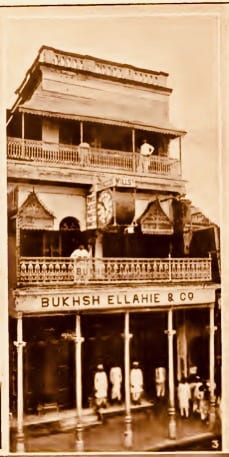
Until 1901 the firm of Bukhsh Ellahie therefore remained the sole agents for the major foreign tobacco companies. It was only in 1901 that E.J. Parrish, the manager of ATC’s Indian operations eliminated Ellahie’s sole agency and instead set up its own distribution depot at 95, Clive Street, Calcutta, with its own devoted staff. While the partnership flourished however, Ellahie innovated once more and advertised the partnership using yet another then still fairly new commodity, i.e. matchboxes.
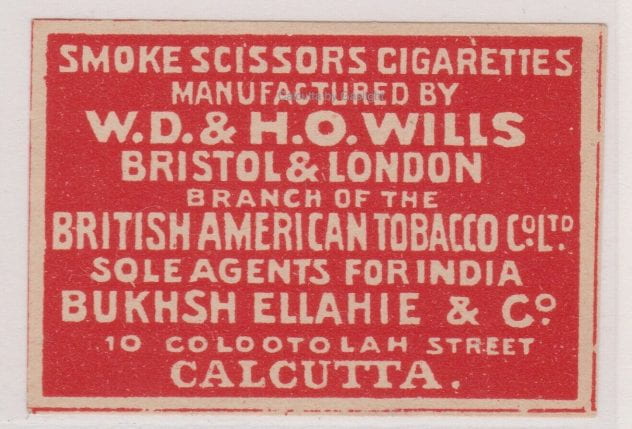
Bukhsh Ellahie & Co. were, as they themselves would later advertise, unquestionably the “Pioneer of the Tobacco Trade in India”. Yet, their mercantile portfolio were not limited to tobacco, or indeed matches. Ellahie was a general merchant and dealt in a wide variety of goods. He was also an official supplier for the Indian Army, thereby acquiring a large and lucrative captive market. Above all, they were one of the first local firms to recognize the importance of foreign trade and worked hard to develop international trading partnerships.
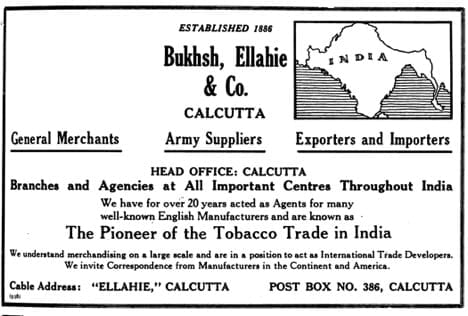
In time, Hajee Bukhsh Ellahie became members of both the Bengal and Punjab Chambers of Commerce and was honored by the British government, first with the title of Khan Bahadur and later, with the Companion of the Indian Empire (C.I.E.). He also became a well-known philanthropist and built or sustained several charitable institutions in his adopted city, Calcutta. On Chitpur Road he built a Musafirkhana or a Traveler’s Lodge. He also founded an orphanage and an association for the burial of indigent Muslims.
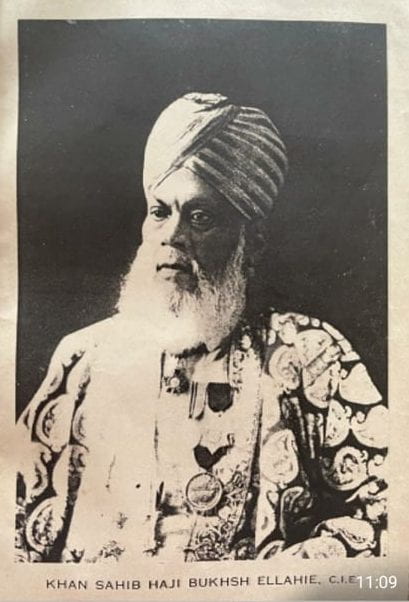
Notwithstanding recent awareness of the unhealthfulness of smoking, Calcuttans continue to smoke in large numbers today. A recent survey found the city is the highest consumer of cigarettes in all of India. Few of these modern smokers however, have ever heard of Bukhsh Ellahie. His once legendary fame and wealth have, alas, disappeared from public memory like the smoke from his Gauhar cigarettes.
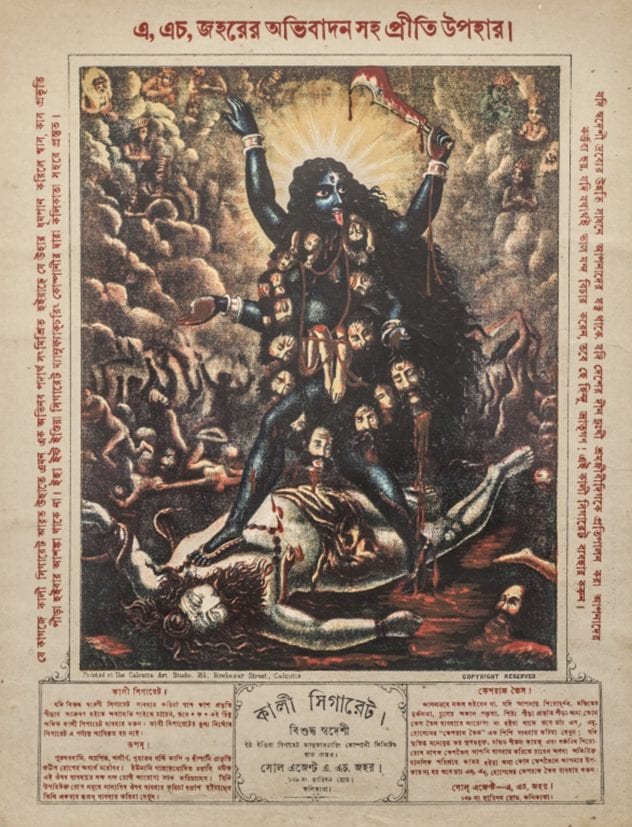
source: http://www.web.sas.upenn.edu / Calcutta by Gaslight / by Projit Bihari Mukharji / August 09th, 2018








